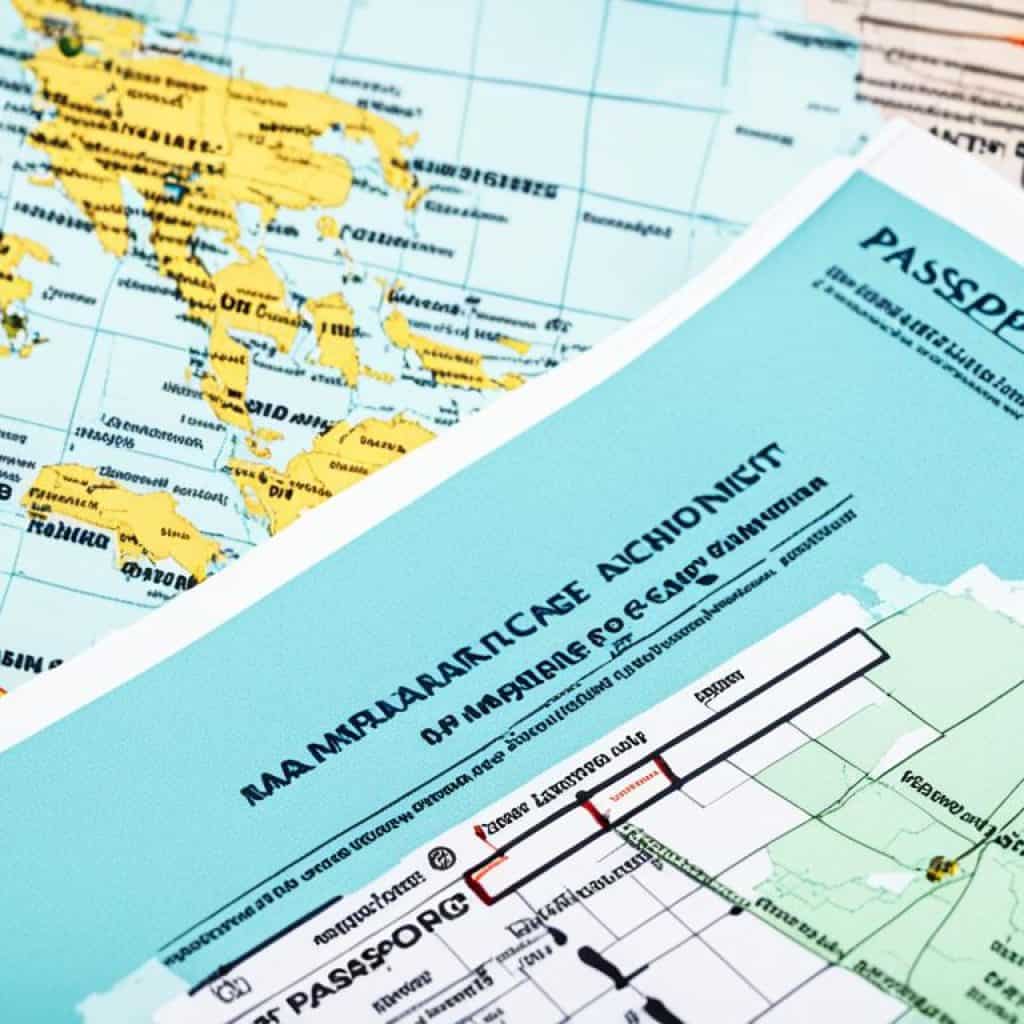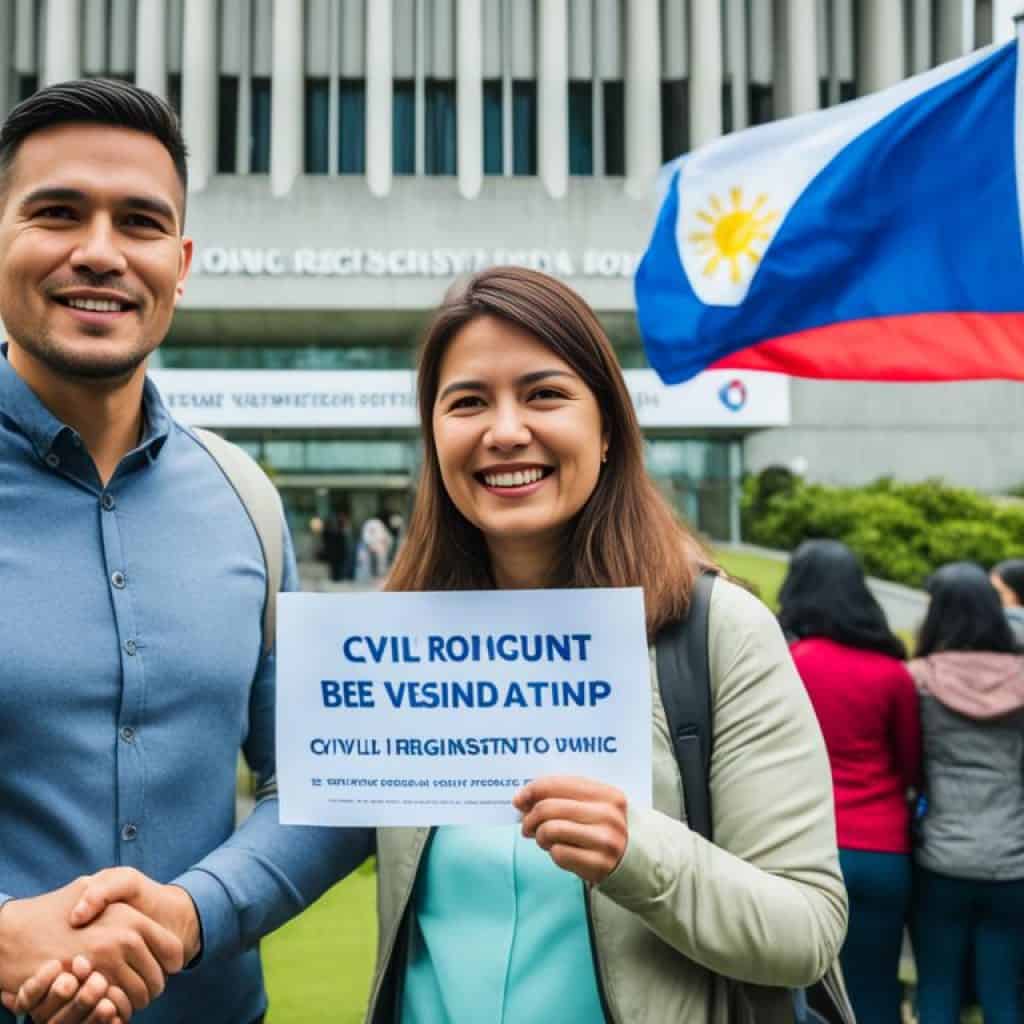Are you a U.S. citizen thinking about getting married in the Philippines? The legal steps for a foreigner to get married there can seem tough. But, with the right help, you can make your wedding day smooth and memorable1. This guide will help you with the key steps to marry in the Philippines as a U.S. citizen. It covers marrying a Filipino citizen or another foreigner.
Key Takeaways
- Marriage license is valid for 120 days after application1
- Civil or church weddings are the two main wedding types in the Philippines1
- Minimum age requirement for marriage is 18 years old1
- Two legal-age witnesses are required for the ceremony1
- Pre-marital counseling duration varies depending on the type of ceremony1
Overview of Getting Married in the Philippines
Getting married in the Philippines is a special experience. It lets couples say their vows in a place full of culture, beauty, and traditions2. But, the legal steps and paperwork can be tricky, especially for those from abroad2. It’s important to know what you need to do to make your marriage legal in the Philippines and back home.
Age is a big thing to think about when planning a wedding here. In the Philippines, you must be over 25 to get married, unless you get your parents’ okay3. If you’re 21 to 25, you have to wait three months after your marriage application is posted if your parents don’t agree or don’t care3.
Being a citizen matters too2. If you or your partner are US and Filipino citizens, it makes things easier2. But, if you’re from another country, getting the right papers, like the Certificate of Legal Capacity to Contract Marriage, can be hard4. The U.S. Embassy in Manila gave out an affidavit needed by the Philippine government, but some local officials wouldn’t accept it4.
Every couple getting married in the Philippines needs the right papers, like IDs, birth certificates, and more2. You also have to take a seminar on family planning and responsible parenthood3.
Dealing with the legal and cultural parts of a Philippine wedding can feel tough. But, with good planning and focus, couples can have a smooth and happy wedding2. Whether you’re from the Philippines or visiting, knowing about the wedding process here is key to a successful and happy marriage2.
“The Philippines offers a unique and unforgettable wedding experience, but the legal requirements can be complex. With the right preparation and guidance, couples can navigate the process and celebrate their love in this beautiful country.”
Civil vs. Church Weddings in the Philippines
Couples in the Philippines can choose between a civil or church wedding. This choice impacts the documents needed, costs, preparation time, and where you register5.
Requirements for Civil Weddings
To have a civil ceremony, you need to apply for a marriage license and provide certain documents. A judge or mayor will officiate the ceremony. You get the license right away, and it’s good for four months6.
Requirements for Church Weddings
Church weddings require more steps, like pre-marital counseling and a church interview. If one partner isn’t Catholic, you need church approval. This process takes longer and can be complex5.
If you’re 18 to 21, you need your parents’ consent to get married. Those 22 to 25 need their parents’ advice in writing. Marrying someone under 18 is not allowed in the Philippines6.
Knowing the differences between civil and church weddings is key when planning a wedding in the Philippines. This helps you choose what’s best for you and makes the process easier5.
“Preparing for a wedding in the Philippines can be tough, especially with documents and getting parental permission. Some couples might choose to marry in places like Georgia because it’s easier5.
Georgia is a great choice for a quick and easy wedding. You can get married in 24 hours. Afterward, you just need to register it with local authorities when you return to the Philippines567.
Legal Age Requirements for Marriage in the Philippines
Getting married in the Philippines means knowing the legal age rules. The minimum age is 18 years old8. But, there are some exceptions.
If you’re 18 to 21, you need your parents’ or guardians’ permission8. For those 21 to 25, you must talk to your parents about your decision8.
Applying for marriage in the Philippines means posting the application publicly for ten days8. You also need two witnesses over 18 to register your marriage8.
Many officials can perform marriages here, like priests and ministers8. The ceremony usually happens in a church or approved place8.
Common-law marriages are accepted if you’ve lived together for five years without issues8. But, marriage licenses only last four months, and proxy marriages are not allowed8. Also, marrying your cousin is not allowed8.
| Legal Age Requirement | Permission Needed |
|---|---|
| 18 years or older | No additional permission required |
| 18 to 21 years old | Written permission from parents or legal guardians |
| 21 to 25 years old | Seek advice from parents or guardians |
Make sure you and your partner meet the age rules to avoid legal problems in the Philippines8. Knowing these rules makes the marriage process easier.
“Marriage is a beautiful and sacred union, and it’s important to ensure that both partners are legally and emotionally ready to take this step. The age requirements in the Philippines are in place to protect the rights and well-being of those involved.”
Whether you’re Filipino or from abroad, knowing the age rules is key for a successful marriage in the Philippines8910.
Requirements to Get Married in Philippines with a Foreigner
If you’re a U.S. citizen planning to marry in the Philippines, you’ll need certain documents. These include a birth certificate, Certificate of No Marriage (CENOMAR), valid passport, and recent passport photos1. You also need to have your U.S. documents apostilled, or officially certified, for the Philippines to accept them1.
Documents Required for Foreigners
Foreigners need these documents for marriage in the Philippines:
- Birth certificate
- Certificate of No Marriage (CENOMAR)
- Valid passport
- Recent passport photos
- Affidavit of Legal Capacity to Marry
The documents needed can change based on the type of wedding, civil or church1. Also, you must be at least 18 years old to get married in the Philippines1.
Apostille of Documents
U.S. citizens must apostille their documents for the Philippines1. This means getting a special seal or stamp from a state authority to prove the document’s authenticity1.
Getting the apostille is key for a smooth marriage process1. Without it, your documents might not be accepted, causing delays or issues1.

Getting all the needed paperwork is crucial for foreigners marrying in the Philippines1. Being prepared and following the right steps ensures a successful wedding1.
“Marriage in the Philippines can be very inexpensive as the civil paperwork is incredibly cheap.”11
Same-sex couples can’t marry in the Philippines due to laws11. But, more expats are marrying in the Philippines for an easy way to get permanent residency through the spousal visa11.
| Requirement | Details |
|---|---|
| Birth Certificate | Provide a copy of your birth certificate1 |
| Certificate of No Marriage (CENOMAR) | Get a CENOMAR to show you can legally marry1 |
| Valid Passport | Make sure your passport is valid for your stay in the Philippines1 |
| Passport Photos | Have recent, standard passport-style photos1 |
| Affidavit of Legal Capacity to Marry | This document proves you can legally marry in the Philippines11 |
Knowing and meeting the requirements makes marrying in the Philippines smooth and successful1. The key is to be ready and work with local authorities to handle legal and cultural aspects1.
Pre-Marriage Requirements in the Philippines
Whether you’re having a civil or church wedding in the Philippines, you and your partner must do pre-marriage counseling and seminars2. These sessions help you prepare for the legal and emotional parts of marriage12. The classes’ length and format differ by the ceremony type, but they’re a must before getting a marriage license12.
Marriage Counseling and Seminars
These sessions cover topics like financial planning, communication, solving conflicts, and planning for the future12. They usually last a few hours and happen once a month12. It’s a key step for both Filipino and foreign couples planning to marry in the Philippines5.
The goal of pre-marriage preparation is to make sure couples know what they’re getting into legally and culturally in the Philippines2. By attending these sessions, you and your partner can strengthen your relationship and understand the big step you’re taking12.
“The pre-marriage preparation classes were incredibly helpful in preparing us for our wedding in the Philippines. We learned so much about the legal requirements, cultural traditions, and the emotional aspects of marriage. I would highly recommend these seminars to any couple planning to get married in the Philippines.”
For both Filipino citizens and foreigners, meeting the pre-marriage requirements in the Philippines is key to a smooth wedding5. Knowing and meeting these needs lets you focus on celebrating your love and starting your new life2125.
Applying for a Marriage License in the Philippines
Getting married in the Philippines starts with applying for a marriage license. This legal document is needed before you can get married. The process has several important steps13.
You and your partner must gather certain documents like a driver’s license, state ID, or passport13. You also need to wait for a 10-day public posting of your marriage banns13. This lets the community know you plan to get married.
After you’ve filled out the paperwork and waited for the 10 days, the civil registry office will give you your marriage license. This license is good for 120 days, when you must get married13. You might also need to pay fees, which depend on where you’re getting married.
If you or your partner are from another country, the application process might be a bit different13. Make sure you have all the right documents and follow the steps carefully. This helps avoid any problems or delays.
| Requirement | Details |
|---|---|
| Identification Documents | Driver’s license, state-issued ID, or passport13 |
| Public Posting of Banns | Mandatory 10-day period where your intention to marry is announced to the community13 |
| Marriage License Validity | Valid for 120 days, during which time you must solemnize your marriage13 |
| Applicable Fees | Vary depending on the municipality where you’re getting married |
Knowing what you need and following the steps makes applying for a marriage license in the Philippines easy13. This is a key step towards a legal and memorable marriage.
Getting Married at the Philippine Consulate or Embassy
If you and your partner are both Filipino citizens, you can get married at the Philippine Consulate or Embassy in your home country. This is a convenient way to get married. You need to set up an appointment, submit documents, and have a Consular Officer perform the ceremony14. The cost for the marriage license is US$25.00, and the ceremony is US$60.0014. The license is valid for 120 days from when it’s issued14.
Steps for Consular Marriage
- Schedule an appointment with the Philippine Consulate or Embassy in your area.
- Gather the required documents, including birth certificates, passports, proof of Filipino citizenship, and parental consent if needed15.
- Submit the completed marriage license application and other required documents15.
- Wait for the marriage license to be issued, which usually takes 10 consecutive days15.
- Attend the marriage ceremony at the Consulate or Embassy on the scheduled date15.
Documents for Consular Marriage
- Marriage License:14 The Consulate’s marriage license is valid for 120 days15.
- Certificate of Legal Capacity to Contract Marriage (LCM): This is needed, and both must be there to apply15.
- Birth Certificates: You need to provide these for both parties15.
- Passports: Show valid passports or IDs for the bride and groom15.
- Proof of Filipino Citizenship: You must provide proof of your citizenship15.
- Parental Consent: Needed if either party is underage15.
- Previous Marriage Documents: If you’ve been married before, bring documents like a divorce decree or death certificate16.
After the ceremony, the Consulate or Embassy will give you a Marriage Certificate16. You can get an authenticated copy of the Marriage Certificate from the Philippine Statistics Authority (PSA) online within 6 to 12 months16.
“Getting married at the Philippine Consulate or Embassy is a convenient option for Filipino citizens living abroad. The process is streamlined, and the Consular Officer can perform the marriage ceremony right there on-site.”
For any questions or help, contact the Civil Registration section at the Philippine Consulate or Embassy16.
Registering Your Marriage in the Philippines
After your wedding, whether it’s civil or church, you must register your marriage with the Local Civil Registrar in the Philippines. You need to submit a copy of your marriage certificate and other documents within 15 days17. Once done, you can get an authenticated copy of your marriage certificate from the Philippine Statistics Authority (PSA)18.
To register your marriage, you’ll need four (4) original copies of the Report of Marriage Contracted Abroad form18. You also need three (3) photocopies of the notarized copy of both spouses’ passport data page18. The fee for registering a marriage is $25.00, which you pay with a money order to the “Embassy of the Philippines”18.
If your marriage certificate doesn’t have info on civil status or previous marriages, you’ll need more documents and three (3) photocopies18. Also, if you’re registering more than a year late, you’ll need an affidavit explaining why18.
Registering your marriage in the Philippines is crucial for official recognition. By meeting the requirements and submitting the needed documents, you can make the process smooth and easy1817.

“The marriage license must be used within 120 days from issuance; otherwise, it will be deemed null and void.”17
| Requirement | Details |
|---|---|
| Report of Marriage Contracted Abroad | 4 original copies required18 |
| Passport Data Page Photocopies | 3 photocopies of notarized copy for each spouse18 |
| Processing Fee | $25.00 money order payable to “Embassy of the Philippines”18 |
| Additional Documentation | Required if marriage certificate lacks information on civil status or previous marriages18 |
| Affidavit for Delayed Registration | Necessary if registering more than 1 year after the event18 |
Validity of Philippine Marriages in the United States
If you got married in the Philippines, your marriage is valid in the United States. The U.S. government accepts all marriages performed legally around the world, including those in the Philippines19. Your marriage is legal in the U.S. if it followed Philippine laws.
Make sure to register your marriage with the U.S. Embassy or Consulate in the Philippines20. You’ll need to send important documents like your marriage certificate, birth certificates, and passports. This step makes your marriage official in the U.S.
Remember, marriage and divorce laws are different in the Philippines and the U.S19. For example, if a foreigner gets a divorce abroad and wants to remarry in the Philippines, the Filipino spouse must get the divorce recognized abroad19. It’s smart to talk to local authorities or an immigration lawyer to make things easier.
If you’re marrying someone from the Philippines or a foreigner in the Philippines, your marriage is valid in the U.S19. Just make sure it meets the laws of both countries. Knowing what you need to do makes starting your marriage smoother.
Getting a “Certificate of Legal Capacity to Contract Marriage” from the U.S. Embassy in Manila costs $50 or the Philippine Peso equivalent21. Also, you have to wait ten business days to get a marriage license in the Philippines, which is good for 120 days21.
If you’re a foreigner marrying in the Philippines, bring your divorce papers and follow the embassy or consulate’s rules19. The U.S. Embassy in Manila can help with legal papers for those getting married after a divorce19.
Knowing about marriage laws in the Philippines and the U.S. helps you through the process. This way, your marriage will be recognized and celebrated everywhere.
Marriage Requirements for Special Circumstances
The Philippines has special rules for those who are widowed, divorced, or underage. It’s important to know these rules to apply for marriage successfully22.
Widowed or Divorced Applicants
If you’re widowed or divorced, you need extra documents. You must show a death certificate or proof of annulment to prove your previous marriage ended23.
Underage Applicants
If you’re between 18 and 21, you need your parents’ permission to get married. For those 22 to 25, you just need their advice23.
These rules help protect everyone’s rights in marriage. Knowing and following them makes the marriage process easier22.
“The Philippines’ marriage laws are designed to safeguard the rights of all individuals, including those in unique circumstances. By adhering to these regulations, couples can ensure a smooth and legally binding union.”
The Philippines has detailed rules for marriage, especially for those who are widowed, divorced, or underage. Learning these rules helps make your marriage in the Philippines successful23.
Remember, marriage laws in the Philippines change. It’s key to keep up with the latest rules24. Working with local authorities and getting professional advice makes the process easier. This way, your marriage will be recognized in the Philippines and other countries too23.
Prohibited Marriages in the Philippines
Planning your wedding in the Philippines means knowing the laws on who can and can’t get married. These rules help protect society and avoid legal issues3.
First, people under 18 can’t get married here3. Those 21 to 25 need advice from parents or guardians before marrying3. Also, there’s a 10-day wait after applying for marriage to post the notice3.
Also, marrying close relatives like first cousins up to the fourth civil degree is banned3. Such marriages are seen as incestuous and are not allowed3.
Remember, the Philippines doesn’t allow proxy or multiple marriages. You can’t marry by proxy or have more than one spouse9.
Lastly, same-sex marriages are not recognized in the Philippines. The law only sees marriage as between a man and a woman9. This is something to keep in mind when planning your wedding.
To make sure your marriage is legal and smooth, learn about the prohibited marriages in the Philippines. Make sure your marriage doesn’t break any of these rules395.
Cultural Considerations for Cross-Cultural Marriages
Planning a cross-cultural marriage in the Philippines means understanding its unique traditions and customs25. It’s important to know about family’s role, traditional wedding clothes, and religious practices. These elements make the wedding memorable and meaningful.
In the Philippines, marriage is both a legal and religious event26. Couples can choose between civil or church weddings. Many keep their faith after marrying someone from a different religion26.
For non-Filipino partners, learning about Filipino culture is key25. Understanding “Pakiramdam” (emotional understanding) and Pinoy Love Language helps in connecting emotionally. This can strengthen the relationship.
Some immigrant Filipinas might not want to see a therapist25. They might feel uneasy about outsiders or past experiences. But, there are ways to learn about Filipino culture. This includes joining Filipino communities, learning the language, watching Tagalog movies, and experiencing the culture more deeply25.
Embracing the cultural aspects of marriage in the Philippines makes the experience unique and meaningful26.
Getting through a cross-cultural marriage in the Philippines takes patience and a desire to learn27. By respecting the country’s traditions, couples can have a wedding that honors their love and blends their backgrounds27.
| Pros of Finding a Filipina Wife | Cons of Finding a Filipina Wife |
|---|---|
|
|
Trust is key in any marriage, especially in cross-cultural ones27. Listening, empathy, and respect help build trust in these marriages27.
“Embracing the cultural aspects of marriage in the Philippines, from traditional attire to religious and spiritual practices, can create a truly unique and meaningful experience for couples embarking on a cross-cultural journey.”
Understanding and respecting the Philippines’ culture helps couples create a wedding that honors their love and blends their backgrounds26. This leads to a deeper appreciation for each other’s culture and a stronger marriage252627.
Tips for a Smooth Philippine Wedding Process
Planning a wedding in the Philippines as a foreign couple can be exciting but also challenging. With the right preparation and mindset, you can make it smooth and memorable. Here are some tips to help you through the Philippine wedding process easily:
- Start Planning Early – Begin planning early because the requirements and paperwork take time4. Remember, the ten-day waiting period for the marriage license doesn’t include weekends and holidays4. This is important for your timeline.
- Work Closely with Local Vendors and Authorities – Build strong relationships with local wedding vendors, venues, and officials4. They can offer valuable insights and help make the process smoother4. Some officials might not accept certain documents, so having the right contacts is key.
- Be Patient and Flexible – Philippine bureaucracy can be slow, so be patient and flexible4. You need to schedule your appointment early for the Affidavit In Lieu of Certificate of Legal Capacity to Marry.
- Familiarize Yourself with Cultural Nuances – Learn about the cultural traditions and customs of the Philippines4. This will help you include them in your wedding, making it more meaningful for you and your guests.
Follow these tips to confidently navigate the Philippine wedding process. Focus on celebrating your love and making lasting memories.
“The key to a smooth Philippine wedding is to start planning early, work closely with local experts, and embrace the cultural nuances with an open and adaptable mindset.”
With the right preparation and a positive attitude, your Philippine wedding will be unforgettable4. Getting the Affidavit In Lieu of Certificate of Legal Capacity to Marry from the U.S. Embassy in Manila costs $304. In the Philippines, you’ll need to pay P120.00 for the marriage license application4. These tips will help you have a smooth and joyful journey to your happily ever after in the Philippines.
Conclusion
Starting your journey to get married in the Philippines as a foreigner requires understanding the legal and cultural aspects. Getting your foreign marriage registered28 and getting a marriage license is a big step29. It might seem tough, but with careful planning and respect for Philippine traditions, you can make your wedding day special.
This guide aims to help you through each step, from choosing between a civil or church wedding to gathering all the needed documents. Foreign marriage requirements30 can differ, but with the right advice and legal help, you’ll find it easier.
Marriage in the Philippines as a foreigner is more than just a legal step; it’s a cultural and personal journey. Embrace the local traditions, connect with the community, and make memories that will last a lifetime. With the right mindset and preparation, your wedding in the Philippines will be a joyous event.
FAQ
What are the requirements to get married in the Philippines as a foreigner?
What is the legal age to get married in the Philippines?
What are the pre-marriage requirements in the Philippines?
How do I apply for a marriage license in the Philippines?
Can I get married at the Philippine Consulate or Embassy in my home country?
What are the cultural considerations for a cross-cultural marriage in the Philippines?
Source Links
- https://www.travelvisapro.com/blog/passports/how-to-get-married-in-philippines-as-a-u-s-citizen
- https://www.reddit.com/r/Philippines/comments/10euu0x/questions_about_civil_wedding_requirements_in_the/
- https://www.brides.com/get-married-in-the-philippines-2303484
- https://rapidvisa.com/definitive-guide-to-getting-married-in-the-philippines/
- https://shuwedd.com/blog/how-do-i-get-married-to-a-foreigner-in-the-philippines/
- https://www.expat.com/en/guide/asia/philippines/35575-getting-married-in-the-philippines.html
- https://www.nuptials.ph/marriage-requirements-for-foreigners-philippines/
- https://tripsupport.ca/blog/what-are-the-requirements-to-marry-a-filipino/
- https://elibrary.judiciary.gov.ph/thebookshelf/showdocs/28/54455
- https://filippinerne.um.dk/en/travel-and-residence/consular-services/marriage-in-the-philippines
- https://nomadicfire.com/getting-married-in-the-philippines
- https://mrandmrshowe.com/lifestyle-blog/foreigner-filipina-marriage-philippines
- https://www.courtly.com/resources/united-states-marriage-not-citizens
- https://newyorkpcg.org/pcgny/civil-registration/getting-married-at-the-consulate/
- https://philippineembassy-dc.org/wp-content/uploads/2022/07/SOLEMNIZATION-OF-MARRIAGE.pdf
- https://newyorkpcg.org/pcgny/civil-registration/report-of-marriage-of-a-filipino-abroad/
- https://www.eventplannerphilippines.com/marriage-registration-philippines/
- https://philippineembassy-dc.org/report-of-marriage-application-by-mail/
- https://www.expatforum.com/threads/married-in-the-philippines-divorced-in-the-us.1541169/
- http://www.chicagopcg.com/reportofmarriage.html
- https://www.fickeymartinezlaw.com/immigration/consular-processing/us-citizens-guide-to-marrying-in-the-philippines-and-immigrating-a-philippine-filipina-spouse-to-the-united-states
- https://wedaways.com/international-marriage-license-requirements-by-country/
- https://www.philembassymadrid.com/marriage-licensesolemnization
- https://www.courtly.com/resources/how-to-get-married-online-in-the-philippines-step-by-step-guide
- https://kalamansijuice.com/in-relationship-with-filipina/
- https://www.nuptials.ph/mixed-religion-wedding/
- https://pinaywise.com/philippines-dating/filipino-bride/marry-a-filipina-discover-the-joys-of-a-lifelong-partnership/
- https://www.respicio.ph/features/foreign-marriage-philippines
- https://assistance.ph/marriage-licenses-philippines/
- https://wedaways.com/international-marriage-license-requirements-by-country







Add comment